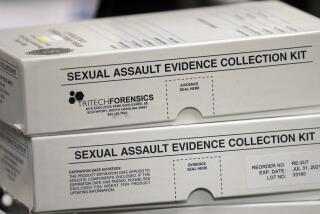House Backs Mandatory AIDS Tests for Some Prisoners
- Share via
WASHINGTON — The House, debating a bill that would provide $1.2 billion for AIDS testing and counseling, Thursday voted to require that all prisoners convicted of prostitution, sexual assault or intravenous drug abuse be tested for the deadly disease.
However, lawmakers soundly defeated a controversial proposal mandating that the names of all persons who test positive for AIDS be sent to state health officials. They rejected also a proposal requiring AIDS tests for all marriage license applicants.
Final approval of the sweeping legislation, which establishes national standards for AIDS testing and counseling, is expected today. House sponsors said that they will meet soon with Senate members, who have passed their own AIDS bill, and agree on the version to be sent to the President.
Rep. Henry A. Waxman (D-Los Angeles), who helped develop the House legislation, said that it focused “limited resources on those patients who need them most and provides those people with some certainties that their private medical information will remain private.”
Critics Want Information
But critics said that the bill goes too far in protecting the rights of AIDS patients and demanded that the government collect more information about the spread of the epidemic.
“I don’t understand all this dilly-dallying about confidentiality,” said Rep. Dan Burton (R-Ind.). “We’re facing a major health crisis. Sooner or later we’re going to have mandatory AIDS testing for all Americans.”
Under the House bill, the government would provide $400 million in each of the next three years to states and community health groups for AIDS testing and counseling programs. In its key provision, the bill would bar the disclosure of the results of AIDS tests without an individual’s written consent.
The only exceptions would include disclosure to health care workers who may come into contact with AIDS patients, to morticians preparing bodies for burial and under a court order. The bill would also permit disclosure of test results to the sexual or needle-sharing contacts of a person who has tested positive for the disease.
During a frequently contentious debate, House members clashed over the role the government should play in trying to control the fatal disease. Much of the wrangling focused on amendments by Rep. William E. Dannemeyer (R-Fullerton) that went far beyond the bill’s guidelines on confidentiality.
Dannemeyer first proposed an amendment requiring prisoners to be tested for AIDS and denying federal funds for counseling and testing to states that refused to comply. He said that the rate of homosexual activity in prison “is well known . . . . This is the kind of activity that can transmit the AIDS virus.”
The amendment was defeated, 266 to 137, with critics saying that such tests are unnecessary for most prisoners and could cost billions of dollars. Instead, the House voted to require tests for persons convicted of prostitution, sexual assault or intravenous drug use.
On a 327-70 vote, the House defeated a Dannemeyer proposal to require that the names of all persons who test positive for the AIDS virus be reported to state health officials.
Rep. Robert K. Dornan (R-Garden Grove), who learned during a stormy public meeting in Orange County last week that his brother-in-law has AIDS, spoke in favor of the proposal. He said that the personal experience “hasn’t changed my position one little bit.”
“Why are we wasting our time, splitting hairs?” Dornan asked. “Sooner or later, the vote in Congress for this proposal will be unanimous.”
Opponents said, however, that compulsory disclosure of AIDS test results would scare off the very people who need to be tested and counseled about changing their life styles. Such a proposal “would defeat the whole purpose of this legislation,” Waxman said.
The House voted also, 302 to 89, to defeat a proposal requiring that all marriage license applicants be tested for AIDS. Critics said that the tests would be too expensive and would turn up relatively few persons testing positive for the disease.
More to Read
Get the L.A. Times Politics newsletter
Deeply reported insights into legislation, politics and policy from Sacramento, Washington and beyond. In your inbox twice per week.
You may occasionally receive promotional content from the Los Angeles Times.










